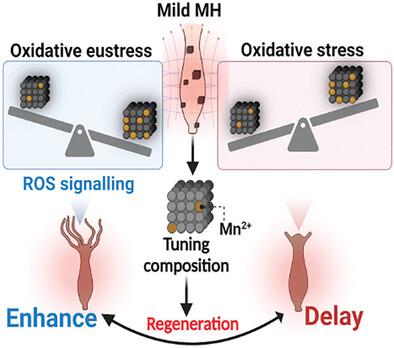当前位置:
X-MOL 学术
›
Adv. Funct. Mater.
›
论文详情
Our official English website, www.x-mol.net, welcomes your feedback! (Note: you will need to create a separate account there.)
Remote Magneto–Thermal Modulation of Reactive Oxygen Species Balance Enhances Tissue Regeneration In Vivo
Advanced Functional Materials ( IF 18.5 ) Pub Date : 2024-07-01 , DOI: 10.1002/adfm.202405282 Giuseppina Tommasini 1 , Susel Del Sol‐Fernández 1 , Ana Cristina Flavián‐Lázaro 1 , Anna Lewinska 2 , Maciej Wnuk 2 , Claudia Tortiglione 3 , María Moros 1, 4
Advanced Functional Materials ( IF 18.5 ) Pub Date : 2024-07-01 , DOI: 10.1002/adfm.202405282 Giuseppina Tommasini 1 , Susel Del Sol‐Fernández 1 , Ana Cristina Flavián‐Lázaro 1 , Anna Lewinska 2 , Maciej Wnuk 2 , Claudia Tortiglione 3 , María Moros 1, 4
Affiliation

|
One of the hallmarks of tissue repair is the production of reactive oxygen species (ROS), which modulate processes such as cell proliferation. Although several attempts have been made to manipulate ROS levels to increase tissue repair, the lack of techniques able to remotely manipulate the redox homeostasis with spatio–temporal fashion has hindered its progress. Herein, a new approach for tuning the ROS levels using magnetic nanoparticles (MNPs) that act as nanoheaters when exposed to an alternating magnetic field is presented. Two manganese–iron oxide (MnxFe3−xO4) MNPs (with a low and a high Mn2+ content) are designed and probed for the possibility of modulating the ROS balance by magneto–thermal stimulation in the invertebrate model organism Hydra vulgaris, able to fully regenerate. By evaluating the expression of selected genes involved in the maintenance of ROS homeostasis and proliferation pathways, a biphasic modulation of the ROS levels played by the MNPs is found. While MNPs with a lower Mn2+ content are able to positively modulate the regeneration potential under magnetostimulation, MNPs with a higher Mn2+ content cause a different redox imbalance, negatively affecting the regeneration dynamic. This innovative approach reveals a novel way of manipulating redox homeostasis that can advance in the field of tissue engineering.
中文翻译:

活性氧平衡的远程磁热调节增强体内组织再生
组织修复的标志之一是活性氧(ROS)的产生,它可以调节细胞增殖等过程。尽管已经进行了多次尝试来操纵ROS水平以增强组织修复,但缺乏能够通过时空方式远程操纵氧化还原稳态的技术阻碍了其进展。在此,提出了一种使用磁性纳米颗粒(MNP)调节ROS水平的新方法,当暴露于交变磁场时,磁性纳米颗粒充当纳米加热器。两种锰铁氧化物 (Mn x Fe 3− x O 4 ) MNP(具有低和高 Mn 2+ 内容)的设计和探索是为了在能够完全再生的无脊椎动物模型生物Hydra vulgaris中通过磁热刺激来调节ROS平衡的可能性。通过评估参与维持 ROS 稳态和增殖途径的选定基因的表达,发现了 MNP 对 ROS 水平的双相调节。虽然 Mn 2+ 含量较低的 MNP 能够在磁刺激下积极调节再生电位,但 Mn 2+ 含量较高的 MNP 会导致不同的氧化还原不平衡,从而对再生动态产生负面影响。这种创新方法揭示了一种操纵氧化还原稳态的新方法,可以在组织工程领域取得进展。
更新日期:2024-07-01
中文翻译:

活性氧平衡的远程磁热调节增强体内组织再生
组织修复的标志之一是活性氧(ROS)的产生,它可以调节细胞增殖等过程。尽管已经进行了多次尝试来操纵ROS水平以增强组织修复,但缺乏能够通过时空方式远程操纵氧化还原稳态的技术阻碍了其进展。在此,提出了一种使用磁性纳米颗粒(MNP)调节ROS水平的新方法,当暴露于交变磁场时,磁性纳米颗粒充当纳米加热器。两种锰铁氧化物 (Mn x Fe 3− x O 4 ) MNP(具有低和高 Mn 2+ 内容)的设计和探索是为了在能够完全再生的无脊椎动物模型生物Hydra vulgaris中通过磁热刺激来调节ROS平衡的可能性。通过评估参与维持 ROS 稳态和增殖途径的选定基因的表达,发现了 MNP 对 ROS 水平的双相调节。虽然 Mn 2+ 含量较低的 MNP 能够在磁刺激下积极调节再生电位,但 Mn 2+ 含量较高的 MNP 会导致不同的氧化还原不平衡,从而对再生动态产生负面影响。这种创新方法揭示了一种操纵氧化还原稳态的新方法,可以在组织工程领域取得进展。






































 京公网安备 11010802027423号
京公网安备 11010802027423号